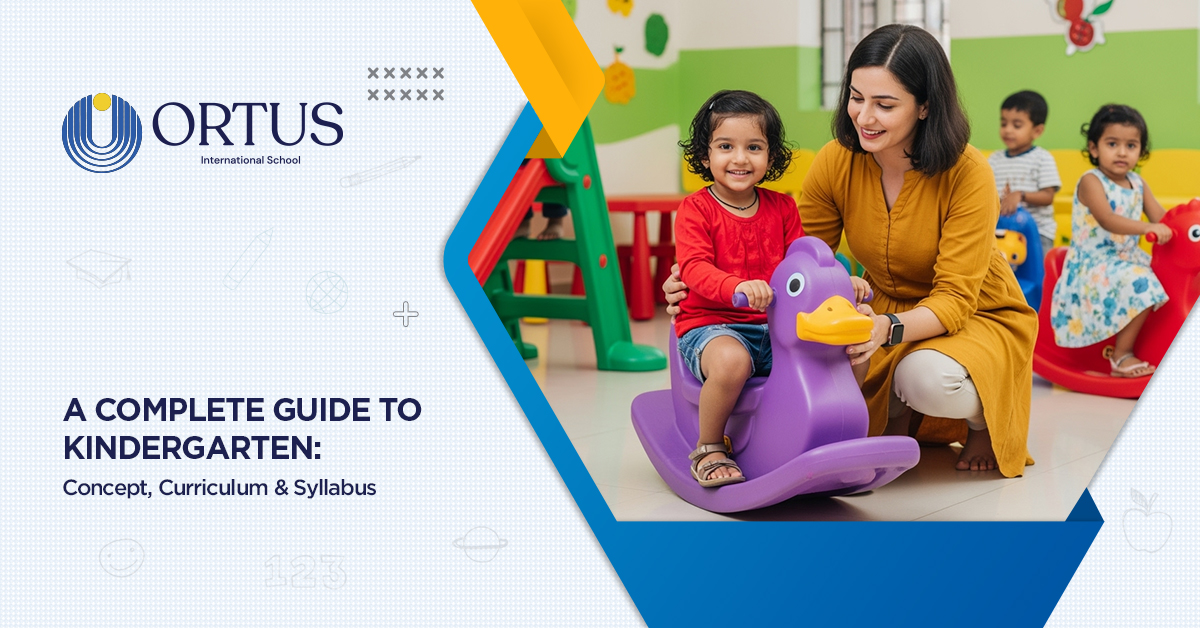A Complete Guide to Kindergarten: Concept, Curriculum & Syllabus

For most children, kindergarten years will be significant in their lives. It is their first experience of a setting outside of home, amidst new friends, play, and learning. As children learn their ABCs and 123s, kindergarten is also the stage in their life to develop socially, emotionally, and intellectually in a secure and enjoyable setting.
For parents, it's simple to become confused while attempting to figure out the ideal kindergarten for your kid. But after you've gained knowledge about kindergarten, it doesn't need to be complicated. This guide makes all this information easy, from the idea of kindergarten and curriculum to what your child will be learning.
What is Kindergarten?
"Kindergarten" literally means a garden for kids and it is indeed that! It's a space for budding minds to grow. It introduces children to schedules, develops their independence and teaches collaboration through group work and play.
Children learn to look after themselves, follow directions, and experience basic concepts like numbers and letters. Most importantly, they learn how to express their emotions, ask questions and feel comfortable in a group.
What Do Kids Learn in Kindergarten?
Kindergarten lessons are uncomplicated, but extremely effective. Children are taught subjects in a friendly and active manner! Children don't sit at tables for hours on end, or read like older children do, rather they learn via songs, games, tales, and play.
The main areas of learning are:
- Language: Letter recognition, new word acquisition, listening to stories, and clear speech.
- Maths: Counting numbers, identifying shapes, learning sizes and patterns, and performing simple calculations.
- Nature and Environment: Learning about the world around them, weather, plants, seasons, and animals.
- Art and Music: Painting, drawing, singing, dancing, and enjoying movement and rhythm.
- Physical Activity: Running, jumping, balancing, and body coordination games.
- Life Skills: Learning to share, clean up, wash hands, follow rules, and be kind to others.
Such things are explained to children in an enjoyable manner so that they remain curious and happy. For instance, children will learn to count through toys or learn about animals from a tale or a tune. At Ortus International School, the learning process is designed to keep children curious and engaged at all times.
How Kindergarten is Taught
Kindergarten is quite different from advanced classes. No memorizing with pressure, nor marks are involved. Teachers instruct lessons through plain words, kindly actions, and entertaining games. The learning climate is cheerful and laid-back.
The intention is to make children happy while learning. Teachers also notice how a child acts, talks, plays, and responds. If a child requires extra help, the teacher helps them gently. Ortus International School integrates this nurturing approach, ensuring each child is guided according to their unique pace and comfort level.
What Age Should a Child Start?
Most kids begin kindergarten at age 4 or 5. Some will be ready a little sooner, and some a little later. It's up to your child. If your child can speak clearly, listen to simple directions, and play with other children, they're likely ready for kindergarten.
A Quick Look at the Syllabus
Kindergarten syllabus is filled with fun and colours. Daily routine includes study, play, rest, and exercise. The children begin learning alphabet and digits in baby steps. They learn art work, sing songs, listen to stories, and play with groups.
They learn about the weather, festivals, food, animals, and individuals surrounding them. They construct buildings with blocks, dress up, and conduct basic science experiments such as planting a seed or making ice melt. The approach at Ortus International School ensures every lesson is hands-on and interactive.
Why Kindergarten Matters
Kindergarten is more than preparing the child for primary school. It guides the child in how to think, speak, share, create, and discover. Children who go to a quality kindergarten generally improve in thinking and social skills. They also settle well into school life later.
Conclusion
The curriculum in Ortus, the top international school in Kokapet, Hyderabad, is contemporary, stimulating, and international in style without sacrificing the warmth and culture that local parents cherish.
This kind of strategy is what sets the Ortus International School, best kindergarten school in Kokapet . apart from the rest. They understand that young children learn most effectively when they feel safe and loved.
FAQs
1. What is the main purpose of kindergarten education?
The primary aim of kindergarten is to foster children's development in all areas of their development learning, social conduct, communication and feelings, in a fun and loving and caring environment.
2. What subjects are typically included in a kindergarten curriculum?
Typical subjects in kindergarten include the basics of math, science, art, music, and physical activities for life skills such as sharing and hygiene.
3. How is the kindergarten teaching approach different from higher grades?
The kindergarten approach is play based, while higher grades use textbooks and formal standardized exams. It is play based, which means social guidelines and results depend on the ways children play, tell stories, and sing songs to learn.
4. At what age should a child start kindergarten?
Most children at that age are four or five years old depending on their level of adult supervision and development readiness in order to learn and play with other children.